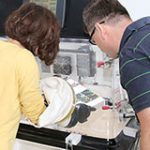Scientific research
University employees, students and young scientists associated with the University of Silesia, who work individually and in teams, are involved in searching for solutions to problems regarded as crucial to civilization development in Poland and worldwide by through comprehensive activities.
The University of Silesia is a place conducive to the transfer of knowledge between generations and the implementation of research, the results of which contribute to the fight against poverty and hunger, improvement in the quality of life of the residents, building a society of the future or the support of environmentally-friendly activities and the fight against climate change effects. The scientific activity of the University supports the implementation of the Sustainable Development Goals of the 2030 Agenda of the United Nations (UN).
Research activities of the University of Silesia were included in five thematic groups defined as Priority Research Areas (PRAs; POB in Polish) and covered such issues as care for the protection of health and quality of life of people, modern materials and technologies, environmental and climate change, humanities for the future and the fundamental properties of nature.
HR Excellence in Research
 |
In order to provide researchers with the best working and development conditions, the University received the right to use the prestigious European Commission distinction, i.e. HR Excellence in Research. |
Online brochures
Research on climate: University of Silesia for climate
» Download the PDF brochure, 1.52 MB
Do you know that…?
Scientists associated with the University of Silesia conduct advanced research on modern amorphous drugs that are the hope for modern pharmacy. Medicinal substances in amorphous form are characterized by high solubility in water and cell membrane permeability, which means that they can act more rapidly, more efficiently and safely compared to commonly used drugs in the crystalline form.

Design and research on nanomaterials are conducted at the University of Silesia. These materials are used to create the following: implants, stents, nanostructured catalytic systems and controlled-release of pesticides. Biocidal nanoparticles which combat crop pests and modern nanomaterials that conduct, process and store the energy are also obtained.
The University of Silesia is a leading unit of the Centre for Polar Studies, within which interdisciplinary research on the natural environment of the Arctic and Antarctic is conducted. Observation of the processes that occur allows to predict the direction of climate change, which is one of the priority challenges of modern nature research. Material for further analysis is collected during polar expeditions organized on regular basis.

Scientists from the University of Silesia belong to a group of pioneers who conduct research on the plant nuclear genome using grass species Brachypodium. Using appropriate bioinformatic tools, they recreate e.g. the history of plant development, dating back even tens of millions of years. These scientists can reconstruct the path of evolution that resulted in the formation of such economically important modern species as wheat, rice, corn, barley or rye.
Issues of civilizational crisis and their cultural implications are some of the problems addressed as part of humanities research conducted at the University of Silesia. In these studies, the historical perspective (including crisis of the ancient, medieval and modern world) is combined with an analytical and diagnostic approach addressing the challenges faced by modern societies such as technological revolution, climate crisis and migration crisis.






